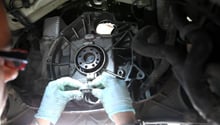Porsche 997: What Are Signs of IMS Bearing Failure?
IMS bearing failure is the black eye of the 911 legacy. There is heated debate about this topic and what to look for, so let's run through some simple things to keep in mind.
This article applies to the Porsche 911 997 (2005-2012).
While almost all Porsche 997s have had their specific issues, there isn't one problem that has created a greater uproar than the M96 and M97 IMS bearing failure. If you know nothing about this issue, here's a brief run-through.
The IMS bearing or Intermediate Shaft Bearing is a very important engine bearing that sits at the end of the engine closest to the transmission. Because of its location, it's not very easy to get to. When Porsche decided to go to water cooling in the 911 with the 996 generation, they came out with an engine designated as the M96. This is where IMS bearing failures started with the 911. The Boxster also has a version of this engine, but it was released earlier in this car than in the 911.
The design flaw with this bearing is that it doesn't receive sufficient lubrication due to its location and the fact that, for some reason, Porsche didn't provide it with any sort of constant oil supply. It is still debatable as to when a bearing will fail, what mileage they fail at, or what exact conditions cause them to fail. What we do know is that they do in fact fail, and when they do, it isn't cheap.
IMS bearing failures do affect 997s as well. When the 997 generation of 911 was released, Porsche redesigned the M96 engine and put a variant of it in the 997 called the M97. For some reason they also carried over the IMS bearing that was known to fail, except they made it even more difficult to swap out due to differences in engine design. This is an issue with any 997 up to model year 2009 that is equipped with the M97 engine.
Let's say you own an early 997.1 that still has an engine with an IMS bearing that could potentially fail. We all know that the best way to protect ourselves is to be proactive and aware of signs to look for so that we can catch a small problem before it becomes a big one. Truthfully, if you own one of these early 997s and you know that the IMS bearing hasn't been upgraded, then the first thing you are going to want to do is have this done. More than likely, due to the age of these cars now, you are going to be due soon for a clutch and, luckily, due to the location, you can knock both out at the same time in order to save on labor costs.

Mileage
From the failures that have been reported, and coming from some companies and shops that have been keep track of these failures, it is generally known that most cars over 90,000 miles, if they haven't had a bearing failure yet, are mostly in the clear. It seems that some of the failures might be due to cars sitting for longer periods of time than others and the bearings, in a sense, drying out. Then, of course, when they are being driven, there isn't any lubrication and the IMS bearing slowly eats itself up until it finally fails completely. So, if you have a car with over 90,000 miles that has yet to have an IMS failure, you are probably good. Under 90,000 miles, and it's probably a good idea to go ahead and get it upgraded as soon as possible.

Visual Cues
There are usually visual signs to look out for that can indicate whether you're on your way to any sort of IMS bearing failure. Here are some basic things to keep an eye out for.
Puddle of Oil Under Car
If you back your car out of your garage or parking space after sitting overnight or a decent amount of time and you see a puddle of oil coming from around the front of the engine closest to to the driver, it's a good sign that you might have an IMS bearing failure. It is also possible that you have a rear main seal failure, but either way it is something you want to have checked out as both are a problem that should be taken care of as soon as possible. When the IMS bearing fails it can also take out the seal near it that keeps the engine oil in the engine. If this seal gets taken out, then engine oil will leak from it, a visual sign that something is wrong.

Sparkly, Metallic Debris in Oil
A good way to be proactive about IMS bearing failure it to keep tabs on what might be in your oil. In Aerospace, they do oil analysis to keep tabs on bearing failures and failures of other engine-associated equipment. If certain types of metal come up in large qualities that are usually used in bearing manufacturing, then they know if a bearing is starting to fail. You can do the same thing for your car. You can even have the oil analyzed by a laboratory; it's not as expensive as you might think, starting at around $50 for a service performed by Blackstone Labs.
The first place you should start is with your oil filter. Whenever you do your oil change, or if you have someone else do it, ask for the old filter and look at the debris in it. If it's shiny or sparkly, there is a good chance it might be bearing material.
Pro Tip
Another place you can check for metallic debris is in the sump pan. If you remove it, you can inspect the back of it and look for metallic debris.
Sounds
One of the first signs of any failure on a car is usually an unusual sound. A good idea when you are driving is to turn off your radio or music so you can hear what your car sounds like as it's driving and going through the rev range. You can even drive through tunnels or in between high solid walls to hear it even better. If you hear anything that sounds out of place, try and pinpoint where the noise is coming from and then see if you can get it to make the noise on demand. On a 911, since the engine is in the rear, any metallic noises that are coming from that area should be a cause for concern, especially if you know your model is prone to an IMS bearing failure.
Technicians say that the IMS bearing failure noise is very similar to the noise a water pump or idler belt bearing makes when it fails; think metallic rattling or banging. Keep your ears open and try to familiarize yourself with what the car normally should sound like so that in case it makes an out of place noise, you will catch it right away. Of course, if you are driving and all of a sudden hear a noise pop up, pull over safely and shut the car off. If you are driving and the IMS bearing fails, the first indication will very likely be a popping noise, and shutting it off at this point could save other engine components from being damaged.
Good IMS Bearing Resources
There are a couple of IMB bearing expert companies that have a lot of experience with these failing and are good online resources for information regarding this issue. Read up because knowledge is power when it comes to these failures. These vendors each have their own solutions for IMS bearing failures as well as information on preventative maintenance.
Related Discussions
- What Does an IMS Failure Sound Like? - Rennlist.com
- Is This the Fabled IMS Rattle of Death? - Rennlist.com
- IMS Replacement - Rennlist.com






